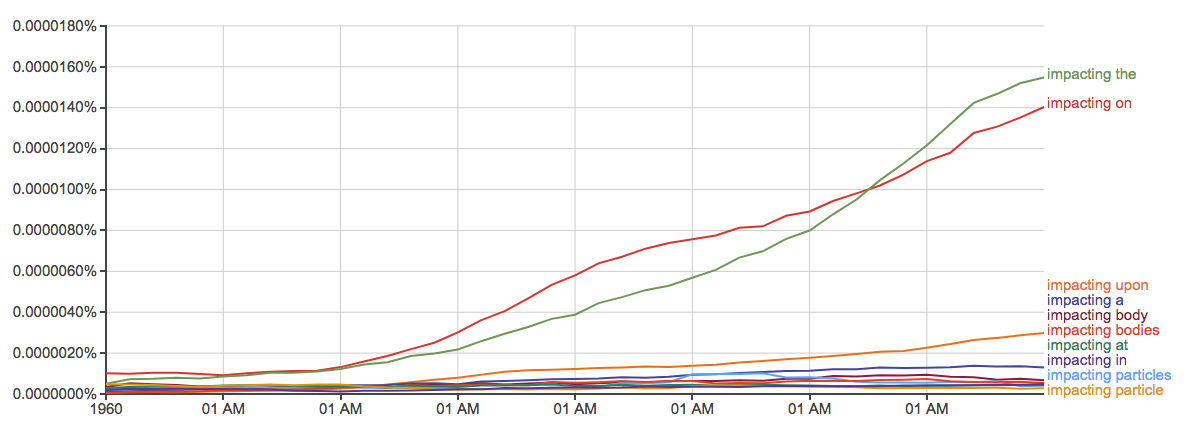In a 2016 twitter poll asking do you feel comfortable using gift as a verb? (ie: “I gifted that sweater to you”), 66% of respondents reported that they found this use ‘icky’. This phenomenon is known by linguists as ‘conversion’ or ‘zero-derivation’, because it involves taking a particular class of word, such as a verb, noun, or an adjective, and deriving another type of word from it without doing anything. This stands in contrast to common-and-garden ‘derivation’, where you convert the class of a word by changing its form somehow. For example, the verb sense becomes a noun sensation, which becomes an adjective sensational, which comes full circle to another verb sensationalise, all by the accumulation of suffixes. (The OED even lists a further derivation sensationalisation – but this sort of style has its own equally vociferous critics, showing you can’t win when it comes to linguistic taste).

In English verbs, nouns and adjectives all tend to look much the same, which makes it possible to zero-derive by stealth. It wasn’t always this way. Take for example the verb stone, a 12th-century example of the noun-as-verb phenomenon, derived from the noun stone (in its Middle English form stōn). Back then, the infinitive wasn’t simply stōn, but stōnen – the suffix –en was obligatory for all infinitives, and makes it clear that the word is no longer being used as a noun. Or compare the noun fight with the identical verb. In Old English the basic form of the noun was feoht, but there was no corresponding verb form feoht: instead, it was feohteð ‘he fights’, fihtest ‘you fight’, fuhton ‘we/you (pl)/they fought’, feaht ‘I/he/she fought’, or one of many other forms, depending on various grammatical properties such as subject (who is doing the fighting?), number (how many people are fighting?) and mood (is the fighting real, hypothetical, or an instruction?). As Old English evolved into its modern form, most of these inflectional suffixes were lost, encouraging a rise in the number of zero-derivations entering the language.
The laissez-faire attitude of English can be clearly recognised when comparing how languages deal with new words such as the recently-coined verb ‘to google’. Some languages, like Middle English stōnen, merely adapt the company’s name to express the grammatical categories which are important in the language (e.g. German du googlest, ‘you google’, ich habe gegoogelt ‘I googled’), while other languages add extra pieces of word to explicitly flag up the conversion, e.g. Greek γκουγκλίζω or γκουγκλάρω (pronounced ‘googlizo’/‘googlaro’), where the final syllable -o indicates that the subject of the verb is ‘I’, but the -iz- preceding it can’t be attributed any meaning beyond ‘I’m a verb!’.
In English, meanwhile, pretty much anything goes: in addition to verbs which have become nouns, we have numerous nouns becoming verbs (e.g. father, storm), adjectives becoming verbs (round, smooth), adjectives becoming nouns (intellectual), and liberal rules governing compounds, which let us treat nouns as if they were adjectives (stone wall). English has such a devil-may-care attitude to conversion that even whole phrases can become nouns or adjectives: basically, it’s a free-for-all.
This has been going on in English for a very long time, so why do examples like gifting make people feel ‘icky’? Partly it’s because we associate coinages like impact, action and workshop with corporate jargon – although some of these are actually of considerable age (impact was a verb before it became a noun, and it started out life even earlier as an adjective), their use boomed in the decades following the second world war, as management increasingly came to be seen as a scientific discipline. Another objection is that we already have words for verbs like to gift, namely give, which makes gift feel like an overelaborate solution to a non-problem, the linguistic equivalent of bic’s infamous ‘for her’ range of pens.

Nevertheless, zero-derivation can come in handy when a word has acquired a different or narrower meaning than the word it originally derived from. Gift originally referred to an action or instance of giving, in addition to the thing being given, but it now almost exclusively refers to something given for free in a spirit of goodwill. You can give someone a black eye, hepatitis, or the creeps, but it would be the height of irony to call these things gifts. Correspondingly, to gift has a more specific meaning than to give, and is much more concise than to give as a gift, just like texting someone is more concise than sending a text message to them, and friending someone is more concise than adding them as a friend on Facebook.

